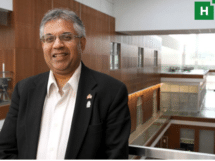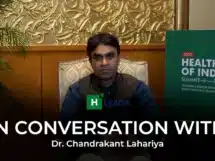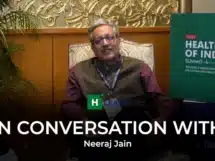Prof Sanjay Zodpey, the President of the Public Health Foundation of India (PHFI), stresses that an effective public health system is key to improving healthcare in a country of 1.4 billion people.
In an interview with Deepika Khurana, Prof Zodpey calls on the central and state governments to increase budgetary allocations for health to reach the target of 2.5 percent of GDP as set out in the National Health Policy.
“This is critical to providing quality public healthcare and ensuring universal health coverage,” he says. “We will also have to continue to focus on health infrastructure and human resources for health in India.”
Excerpts from the interview:
How is public health important from an economic point of view?
There is a bidirectional relationship between health and economic development. Our honorable Prime Minister (Narendra Modi) has announced the aspiration and dream of a $5 trillion economy. The health sector can be a part of economic growth and development. The contribution of the health sector to the world economy is around 10 percent. In comparison, if you look at the Indian economy, till recently, the contribution of the health sector was around 6 percent. The health sector has potential to contribute more to the Indian economy. When you have a rise in life expectancy, it also contributes to the growth of GDP. A healthy population is the foundation of a growing economy.
As the economy develops, we will be able to spend more on health. When the economy rises to $5 trillion, there will be more resources available to spend on health.
How can we strengthen public health in India?
Strengthening public health is important for all countries in the world. India is quite a private healthcare dominated country. There are a lot of people who depend on the public sector for healthcare services. This is especially important for people who are below the poverty line or come from the lower middle class.
The government is committed to providing healthcare to the population. There is an upfront commitment on the part of the Union Government and the states to provide healthcare.
There are two aspects of public health. Firstly, public health is not synonymous with providing healthcare. Public health is beyond the provision of healthcare services. Prevention, health promotion and specific protection are integral part of public health.
Public health is truly a multidisciplinary discipline. Illustratively, if we want to control the effects of air pollution on health, we will have to reduce air pollution. The air pollution reduction policies are beyond the health sector. So, when we talk about public health, it is with the realization that providing healthcare is only one aspect, and the broader social determinants of health are also important in ensuring healthcare.
Initiatives to uplift the people below the poverty line, nutritional and agricultural security will also help improve the health of the population. So, I think we should look at health and public health from a broader perspective that extends beyond the conventional health sector.
What are some of the obstacles to improving India’s public health system?
We must continue to invest and strengthen our healthcare infrastructure. This should be accompanied by continued attention to the adequacy and competence of healthcare staff. We need a broader perspective as to what influences our health status. This awareness regarding health is important, and good health arises from multiple interventions. For instance, the Swachh Bharat Abhiyan is a very good initiative of the government. We all, including you and me, are responsible for keeping our neighborhood clean. Similarly, the Pradhan Mantri Ujjwala Yojana also has public health implications, we need to see it from that perspective.
What is your analysis of the budget for 2023-24 in terms of the allocations for healthcare? What, according to you, were the major hits and misses?
I would like to applaud the government for prioritizing the nursing profession and nursing education. Strategic investment and commitment in this direction can make India a global hub for nursing education.
The Indian Council of Medical Research (ICMR) has laboratories across India. Leveraging those laboratories and allowing other institutions, both public and private, to work collaboratively will enhance our research productivity. Similarly, giving importance to sickle cell disease, which is common in the tribal population, is also a positive move.
Moving forward, our National Health Policy mentions that about 2.5 percent of our GDP will be spent on health. I would say we are yet to reach that target, but that too will happen over time.
We must prioritize several important sectors. For example, there are several initiatives for boosting agriculture, investments in the social sector, investments in infrastructure development, etc. Sometimes we should not just look at the budgetary allocations for health. Definitely, we need more resources in public health, but there are many things that can be achieved with limited resources.
While it is admirable that the government is bringing in a law to strengthen public health governance in India, do you agree the job will remain half done if the shortage of doctors persists?
I don’t think that job will remain half done, but we will have to respond to several challenges. A shortage of health professionals was one of the challenges that we have experienced in the past. In the last ten years, there has been a tremendous growth in medical education in India. The growth in the number of medical colleges in the past few years has been phenomenal. We now have close to 600 medical colleges in the country.
Earlier we had only one AIIMS which is the hub for tertiary care in the country, but look at the number of AIIMS that have been established in the last decade. Also, a lot of district hospitals have been transformed into medical colleges, so we can be certain that the number of doctors will improve.
More than a shortage, our problem is the distribution of manpower. Healthcare professionals are more concentrated in urban areas than in rural areas. But to tackle this problem, there have been a lot of initiatives taken by the government. Like if you work in a rural area, then you get the opportunity to enroll in a post-graduation program. Some state governments have provided additional incentives, like if you work in a hard-to-reach area, you get some points for promotion. In some states, the government has increased the retirement age for doctors. Going forward, I see this shortage issue getting resolved because we are on the right path.
What do you see as India’s biggest healthcare challenge in the next decade?
There would be multiple health challenges in a country. The burden of non-communicable diseases such as diabetes, hypertension, stroke, heart diseases, cancer etc. is increasing.
Traditionally, our public health system was better prepared to deal with maternal and child health and infectious diseases. But now, in the last couple of decades, we have trained people to deal with non-communicable diseases as well. We would need to emphasize more prevention and control strategies for non-communicable diseases.
That said, we will also have to deal with emerging infectious diseases. COVID-19 emerged out of nowhere and shattered the world economy, and brought our lives to a standstill. We will have to strengthen our disease surveillance systems to keep a check on newer pathogens and new diseases that are likely to emerge.
Why is trust crucial to public health strategy? And how do you build more trust in the public health system? Is budget a constraint?
Of course, if the budgetary allocation is increased, people will feel that something is happening. Undoubtedly, budgets and resources are necessary, but beyond budget, we need commitment from other sectors as well.
We have to improve our Primary Health Centers and District Hospitals to provide prompt and quality healthcare. The will increase trust in the public health system.
Do you think we need more data and evidence-based policymaking so that we can see the impact of various programs on outcomes?
Absolutely, Data and evidence are important for any decision-making. As new diseases emerge, we must evaluate the new interventions that are being carried out to generate evidence.
All our programs and policies should be based on evidence generated through rigorous research. That is precisely the reason why the Indian Council of Medical Research (ICMR) or institutions like the Public Health Foundation of India (PHFI) or medical colleges that do a lot of research in public health, play a crucial role in contributing to programs and policies.
Also Read : ‘Public health should take precedence over curative medicine’


















Add Comment